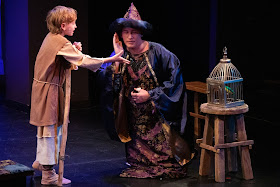I just deleted a whole paragraph that I wrote trying to explain the music and how it sounded to me. Know that Menotti rejected the post-World War II atonality and stuck with lyrical music. In my mind he is more Puccini than Stravinsky, if that makes sense. This performance was backed by a single piano played by Music Director Carson Rose Schneider. In a small intimate space like the Andy Boss, it was the perfect backing. This is the second year that Skylark has presented this opera during the holiday season (the photos are from 2021), and from what I gathered it is newly directed this year by Jeffrey Madison. The set was simple, the direction was clean and clear. It found humor when it could, it found drama where it was, and overall it was a fantastic production.
The story, briefly, is about Amahl (a disabled boy) and his widowed mother living in a small house in Judea. He comes in from outside talking about the biggest star he has seen, and his mother gives him grief for lying and telling tales. Later that night as they both sleep, there is a knocking at the door. After some banter where Mother thinks that Amahl is lying again, she answers the door and there are the three Wise Men, or Kings as they are listed in the program. The Kings ask to come in and rest. Amahl is sent out to gather the neighbors and nearby shepherds as his family is too poor to have any food to offer. Everyone comes in, gives gifts to the Kings, there is a dance, and then they leave. As everyone settles down to sleep, Mother sees the box of gold and has a wonderful aria about the difference between the rich and the poor. How much a single piece of gold could do for her family, and how the rich King wouldn't even notice it was gone. She takes a bracelet and is caught by the Page, who wakes up the Kings and wants punishment. Amahl fights back and King Melchior (the bringer of the gold) understands her point of view and decides to give her the piece of gold. The Kings agree that the child they are bringing the gold to doesn't really need it, and the three (eventually adding the Mother) sing a wonderful aria that brings in the faith aspect of the season. The opera ends with a miracle which I won't reveal but even though I assumed it was coming, I still found myself tearing up. I would think that this might be a tough opera to cast because it needs a boy to sing the role of Amahl. This production has twin brothers who alternate performances - Oskar and Henry Helle-Morrissey. I'm not sure who I saw today but he was charming. There were a few moments that seemed challenging vocally, though it may have been opening day nerves. He stayed connected with the work, and he had a very sweet energy about his character. Mother (Vicki Fingalson) has a great voice that really shows her strength in her aria "All That Gold." She is a great counterpart to Amahl. The Kings - Kaspar (Wesley Frye), Melchior (Robert Riordan), and Balthazar (Lloyd Reshard) are all amazing. Frye finds so much humor in the role of Kaspar, and is a great contrast to the more serious roles of Melchior and Balthazar. All three of them work and sing so well together, it was a joy to listen to them. The Page (Jacob Koshiol) has a small song when he catches Mother stealing, and I wish he had more. Koshiol has a great voice and I will keep my eye out for all five of these adult leads so I can hear more of them. The chorus of villager and shepherds included two dancers who have a charming dance in the midst of the show. It felt a bit old school (think Mozart having to have a ballet in his opera), but it also worked as a nice visual break.The opera has a few recordings, and it looks like one DVD might be available of a 1955 Telecast. Despite that I would really recommend heading out to see this wonderful production. It runs less than an hour, and is perfect for the whole family.



No comments:
Post a Comment